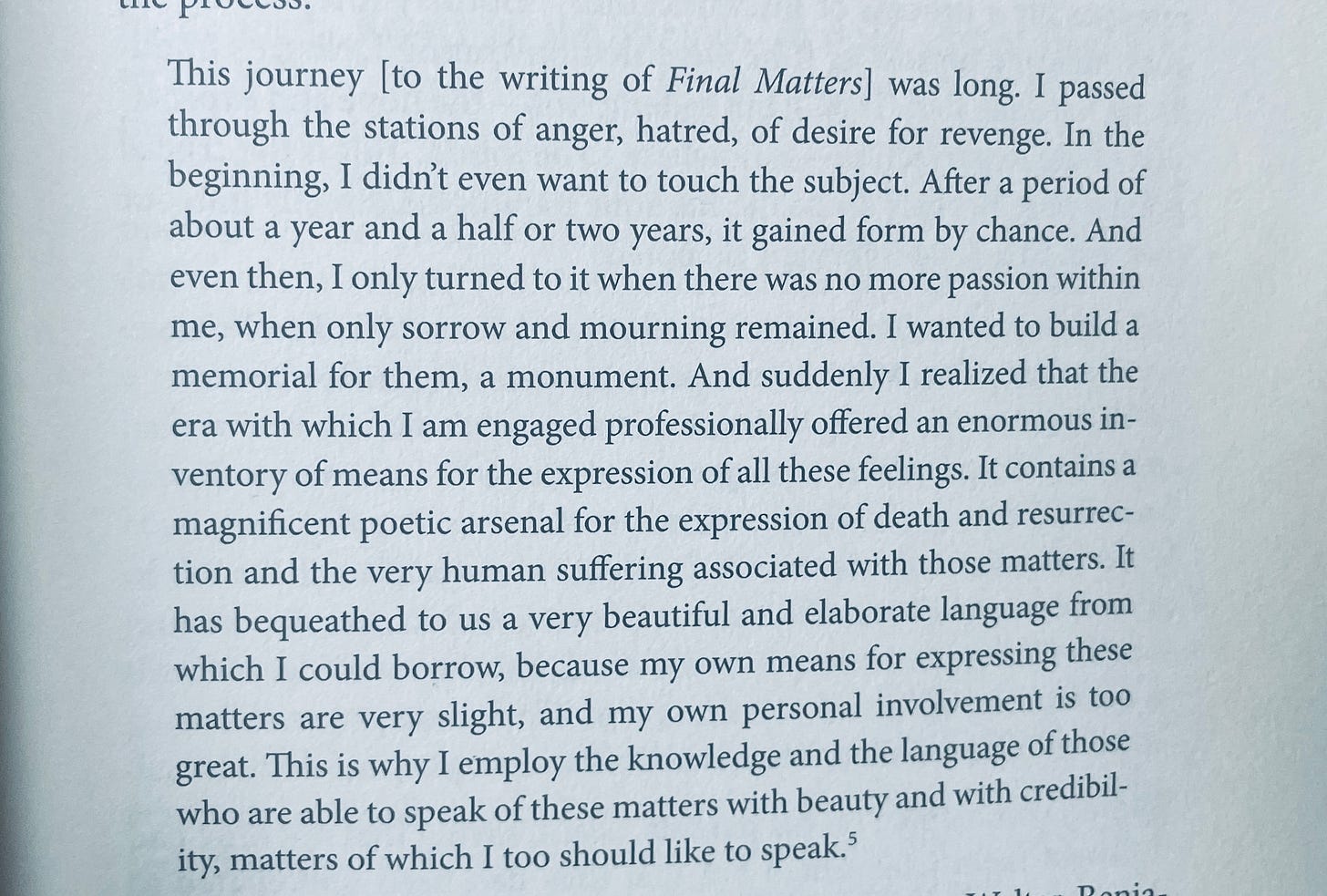Dear Readers,
Guided Poetry Book Groups are my new offering: facilitated sessions for committed poetry readers and writers who wish to engage in a practice of reading more deeply, creatively, and intentionally.
Each month, I guide small groups through a close reading of a current book of poetry—books that are overlooked and underrated; books that have something important to tell us about what it is to be alive today.
This brief post is a catalyst for discussion for Szilárd Borbély’s “In a Bucolic Land.” This thread is a place for members of the reading group to answer the questions I’ve posed and to pose questions of their own. And though it’s intended for members of the reading group, I welcome comments from anyone committed to a deeper, more intentional reading of this important book.
I’m including a few reflections below to kick us off.
I’m going to announce the next round of reading groups in late October. Send me an email if you’d like to be notified when registration opens for the January 2023 cycle.
Sean
Discussion prompts: “In a Bucolic Land”
Szilárd Borbély’s In a Bucolic Land has many sources for its raw material. One of these sources is an event that took place st 2 a.m. on December 23, 2000.
Burglars invaded Szilárd Borbély’s parents’ house in Jánkmatjis, in northeast Hungary. They knocked his father unconscious and killed his mother with a meat axe as she was sleeping.
Borbély didn’t plan on writing about these horrible events, but six years later he did—in a book of poems titled Final Matters (2006). In a 2008 interview, Borbély explained his process of finally addressing this subject in his poetry:
A few questions to spark our conversation:
Do you find the poems in In a Bucolic Land “to speak of these matters with beauty and with credibility?”
Are poems, for you, portals for “the knowledge and the language” of others, or do believe that poems should serve a primary function of self-expression?
If you are to write about human suffering, how might it be necessary to borrow from others—from the “magnificent poetic arsenal for the expression of death and resurrection?”
Discuss.



When I try to write about human suffering (that is, the suffering of others), it's imperative I remind myself that I am only a witness not a victim by association. (When I'm the victim, I assume I'll know it & won't need many/any reminders.) I have to remind myself to try to identify with the others' suffering as much as I can AND only up to a point. I have to remind myself that no matter how well-intentioned my motives may be, I'm always dangerously close to co-opting someone else's suffering for my art, or whatever. To do /that/ is disgusting & unforgivable. I have to remind myself to tell my 12-year-old self to knock it off, that suffering isn't a contest nor is it some perverse bromide for whatever aches my soul may have that day. The fact that I have to remind myself of these, & a great many other things, means, of course, that I'm a repeat offender of these, & a great many other things, when I try to write about the suffering of others.
Another way, maybe, to think about this question--an essential one--is to consider what the "real" or "true" subject of any elegy may be. The answer is always the same in every case: every elegy ever written is in many ways unconsciously, though primarily, about the self writing it. That's an ugly fact, but if we're cognizant of it we can begin to work against it.
One of the ways Borbely manages to write about his own suffering is using the frames & templates (per se) of myth. He's able to abstract himself from the trauma (temporarily, as any of us can only hope for) to write about that trauma as though it happened to someone else (which in a way, it did; he's not the same person in the year 2000 as he is in the year 2014, for example). Myth universalizes suffering, generally; in Borbely's case, myth universalizes suffering while it also eternalizes it, & in order to achieve any of this, he must first externalize his suffering, identify his with that of others. Were he not able or willing to reach out from his own suffering into others', In a Bucolic Land would not just be a lesser poem; it would not exist.
No matter how impersonal a poem (or any work of art) may seem or be, the fact that a person still wrote it is irrefutable. The self's limitations are, ironically, boundless. For example, as much as I'd like to get out of my head, go beyond my experiences, feelings, & thoughts; my autobiographical "I" can go only so far. I can't not (alas) be me, & as a younger writer I found this to be freeing. Eventually, like sugar, the allure of the self wears off. Good thing, too, because it's a selfish, self-involved approach to writing. The more of "the knowledge and the language" of others I can understand, the better (however we might try to define "better") I might be as a poet, sure, but as a person, too. It's really hard to be a racist, sexist, elitist jerk when I'm reading in the library all day...I hope.